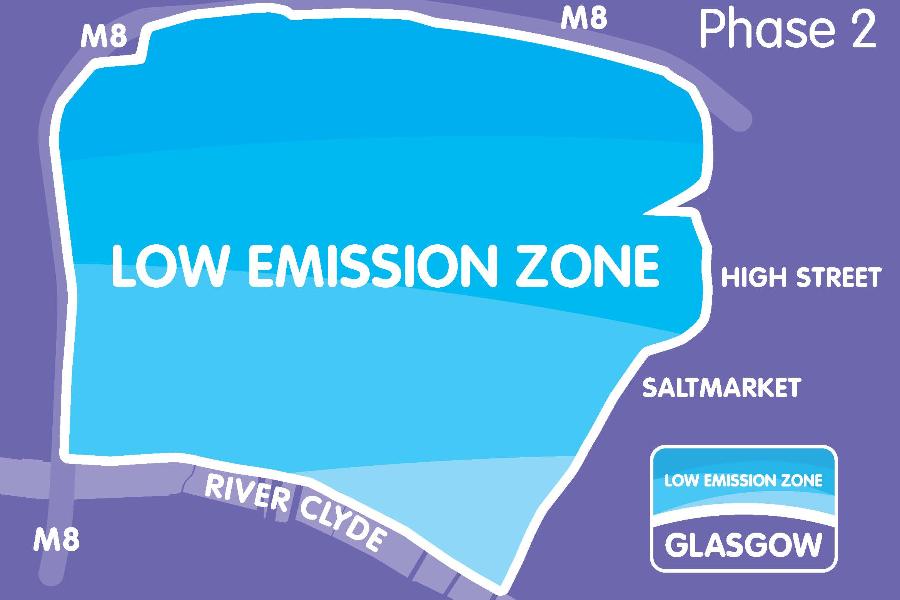Plans to maximise the positive health and environmental impacts of Glasgow’s Low Emission Zone by widening its scope to include all vehicles driving into the city centre from June next year, has been agreed at today’s City Administration Committee.
As the main source of harmful nitrogen dioxide levels in our city centre is from road traffic – Glasgow’s LEZ is an essential measure to improve air quality, protect public health and support wider climate change ambitions by encouraging more sustainable transport options.
Phase 1 of Glasgow’s LEZ was introduced in 2018 – with a much greater proportion of cleaner, low and zero emission buses now travelling through our city centre. Subject to Scottish Ministers approval, Phase 2 of Glasgow’s LEZ will be implemented on 31 May 2022 and enforced from 1 June 2023 following a one-year grace period. Enforcement for zone residents’ vehicles will start from 1 June 2024.
Cllr Anna Richardson, City Convener for Sustainability and Carbon Reduction said: “Glasgow’s air quality situation is pressing, not least because of the chronically high levels of air pollution in some of our streets.
“Seeking to restrict the most polluting vehicles from our city centre is the right thing to do to ensure that we mitigate the health harms caused by air pollution. Whether it is the impact on cardiovascular disease and breathing conditions such as asthma, or the less obvious contribution to conditions such as dementia, diabetes or cancers, air pollution affects us all.
“I’m delighted that the council has today approved the final scheme design for the second phase of Glasgow’s LEZ, which will see all vehicles entering the zone having to meet cleaner emissions standards to avoid a penalty charge.
“As next June approaches, we will continue to raise awareness and understanding of Glasgow’s LEZ and engage with those most affected to encourage and support emissions compliance. We will also continue to back a wide range of projects and initiatives that ease accordance with our LEZ, including those that encourage higher levels of active and more sustainable travel and a reduced reliance on private vehicles.”
Scheme Details and Next Steps
Key entry requirements for Low Emission Zones in Scotland have been set at national level for consistency. In general, diesel engine vehicles registered after September 2015 and petrol engine vehicles registered from 2006 onwards will usually meet the required emissions standards, as will buses, coaches and HGVs registered from January 2013.
Glasgow’s LEZ will apply to all vehicle types, except for motorbikes and mopeds and those vehicle types or uses considered exempt – this would include emergency vehicles and vehicles for disabled persons, including blue badge holders.
Failing to comply with LEZ requirements will result in a penalty charge. This is set nationally at £60 and is reduced by 50% if paid within 14 days. Where repeat entry by the same vehicle is detected within a 90-day period, this penalty charge rate will double, doubling again on each subsequent entry up to a maximum amount determined by vehicle type.
Complementing the nationally set elements of LEZs in Scotland – the council has determined the design and operation of our own scheme based on local requirements.
Glasgow’s LEZ will operate 24 hours a day – all year round, with the zone covering an area of the city centre bounded by the M8 motorway to the north and west, the River Clyde to the south and Saltmarket/High St to the east.

Practical, targeted assistance from the Scottish Government to help prepare for the introduction of LEZs has included vehicle retrofit support and money for lower income households and small businesses through the LEZ Support Fund. Interest-free loans are also available through the Energy Saving Trust for purchasing e-bikes, electric vehicles, and home charging points. This focused response has made funding accessible to those who may have the most difficulty complying with LEZ requirements, as well as incentivising a shift away from personal vehicle use.
To reflect the impact of the pandemic on the uptake of the retrofitting scheme – taxi operators who can demonstrate by early 2023 that they have applied for retrofitting grants, are awaiting vehicle conversion work or are in the process of purchasing a compliant vehicle will be able to run their business without penalty should their taxi not yet be compliant by the time the LEZ becomes enforceable.
Following today’s committee meeting, Glasgow’s LEZ final scheme design will now be submitted to Scottish Ministers for approval.